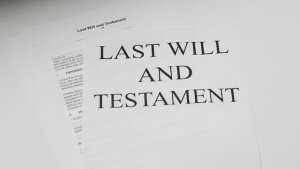Evidence Needed When Contesting A Will

Contact
Table of Contents
There must be a clear legal reason to contest a will on someone’s death, backed up by strong evidence.
Contesting wills requires that the person contesting the will has a vested interest in the estate and is able to provide sufficient evidence to support their claim. A will can be contested for the following reasons in England and Wales:
- Lacked of testamentary capacity
- Undue influence
- The will or its signature is a forgery
- Lack of knowledge and approval
- The will is not executed properly / doesn’t meet legal formalities.
Each of these reasons has its own set of requirements for evidence.
Lack of Testamentary Capacity
Testamentary capacity refers to the mental capacity of the person making the will (the testator) at the time it was created. The law says that, when a will is drawn up, the person making it must be of “sound mind, memory and understanding,” meaning they must have sufficient mental capacity to make a will This means they must:
- Understand they are making a will
- Roughly know what assets they’re leaving
- Understand the consequences of excluding or including certain people from their will, and
- Not have an illness such as dementia, mental illness or delusions
It’s presumed that a testator has mental capacity, unless there is clear evidence to the contrary.
What evidence is needed to prove lack of testamentary capacity?
Medical evidence, such as capacity assessments, can usually show whether the testator had mental capacity. Witness statements from people who were in close contact with the deceased are also important for painting a picture of their mental state. The evidence of the solicitor who prepared the will is also important.
If a will is rational on its face capacity will be presumed and it will be for the person who is raising concerns as to capacity to prove the same. This is not always clear cut. Where someone has a degenerative condition like Alzheimers’, they can be lucid some days and not others. If the testator had lost mental capacity at the time the will was made, this could be grounds for contesting the will. To challenge the will, you would have to prove that, at the time the will was created, the testator lacked capacity.
Undue influence
A will is not valid if it was made because of pressure from another person, known as “undue influence.” This could include a range of coercive behaviours, from physical violence to verbal threats and the slow drip, drip of pressure designed to wear the testator down.
What matters is not the behaviour itself, but whether it overcame the testator’s free will. Proving actual undue influence requires sufficient evidence that the testator did not act of their own free will and that their decisions were not made independently. The standard for actual undue influence is high, as it must be clearly shown that the will was made under coercion or manipulation and does not reflect the testator’s true wishes?
What evidence is needed to prove undue influence?
Undue influence has a high evidence threshold because it is hard to prove. It’s relatively common for someone to appeal to family ties or affection in the hope of securing an inheritance (“You know I’m the only one who really cares about you”), but that is not considered undue influence unless it clearly overpowered the deceased’s own wishes.
The court will need to be satisfied that coercion is the only reasonable explanation for the testator’s actions. Specifically, you’ll need evidence to show they acted out of character, doing something very different in their will to the wishes they expressed before. Witness testimonies can be valuable evidence in these cases, as can letters, emails, text messages etc. showing attempts to influence or isolate the testator. But since coercion tends to happen behind closed doors, this evidence can be hard to come by.
Undue influence case study: Scrap King millionaire Tom Goodwin
In 2021, Gary Goodwin, son of self-made millionaire and ‘scrap king’ Tom Goodwin, won his late father’s £4 million fortune after a legal battle with his sister over his father’s will. Tom had fallen out with all of his children over the years, resulting in several will changes before his death. The siblings asked the High Court to determine which version should prevail. The existence of an earlier will can significantly impact the legal process, as the court must consider whether a prior, unrevoked will should be admitted instead, and how this affects the distribution of the entire estate.
The main allegations were around undue influence. The sister alleged that Gary had “physically dominated Tom, acting in an aggressive and controlling manner towards him in his old age.” In a belt-and-braces challenge, she also claimed that Tom was not of sound mind when making the 2017 version of his will which left everything to Gary.
The court disagreed on all fronts. The judge determined that Mr Goodwin was not scared of his son and was not “overawed by or in any way subject to the undue influence of anybody.” The judge was also satisfied that Mr Goodwin retained full mental capacity. Witnesses testified that the terms of the will reflected his wishes and had been discussed with him before he executed it.
- For more information on the rise of older and vulnerable people being pressured into changing their will, read our blog post: What is fraudulent calumny?
Fraud and Forgery
A will is not valid if either the will itself or the signature on it is a forgery. This can include scenarios where:
- The whole will is a fake.
- Someone impersonated the testator and forged their signature, or the testator’s signature appears suspicious or inconsistent.
- The testator was tricked into signing the will, believing it to be a different document.
What evidence is needed to prove fraud or forgery?
In many cases, a handwriting expert is needed to compare the signature on the will with known examples of the testator’s writing. Previous versions of the will can often be useful as they shed light on the testator’s intentions. Witness testimonies or CCTV footage showing who was present when the will was signed can also be important evidence.
Fraud is a criminal offence, and the standard of proof is very high when allegations of fraud are made. The person challenging the will needs to establish fraud or forgery beyond reasonable doubt. If the handwriting expert’s report is inconclusive, it is unlikely that a claim for forgery will succeed. Read how a beneficiary successfully contested a forged will with the help of a handwriting expert.
Lack of knowledge and approval
For a will to be valid, the testator must have knowledge and approval of its contents. This will be presumed in the vast majority of cases, assuming the will was executed correctly. It is essential that the will accurately reflects the testator’s wishes; otherwise, errors may result in the intended beneficiaries not receiving what the deceased intended.
However, suspicions can be raised if it is a “DIY” will and the testator took no advice in relation to it. A common scenario is where a beneficiary gives instructions for what should appear in the will, or even writes the will themselves, and the testator simply signs it without reading it over.
What evidence is needed to prove lack of knowledge and approval?
When the will has been prepared by someone other than a solicitor, it’s generally easier to persuade a court that the testator didn’t know or approve of its contents. A combination of evidence may be needed to build a case, such as:
- Medical records showing the testator’s physical or mental impairments that may have affected their ability to understand the will’s contents
- Witness testimonies from people who observed the testator’s state of mind or behaviour around the time the will was executed.
- Documentation showing suspicious circumstances surrounding the will’s creation, such as drafts prepared by someone who benefits from the will, or the testator mentioning different terms to what actually appears in the will.
- Letters or text messages indicating the terms of the will are not in accordance with the testator’s known intentions.
Will does not meet legal formalities
Section 9 of the Wills Act 1837 sets out various requirements that must be met for a will to be valid. In particular, for a will to be properly executed, it must be signed by the testator in front of two or more witnesses, and those witnesses must also sign the will.
The courts take a pragmatic approach when interpreting this section. They’ve held that thumbprints, initials and even the wrong name amount to a legal signature, and you can literally write the will on the back of a cigarette packet, as long as the necessary formalities are met. Our will writers, can help ensure your will is properly executed and meets all legal requirements, reducing the risk of it being challenged.
What evidence is needed to prove a will does not meet legal formalities?
In most cases, it is fairly obvious whether a will meets the necessary formalities. When disputes arise, it’s often over whether witnesses were actually present when the testator signed the will. Their evidence is crucial. If a witness admits to signing the will later (or not at all), that may be enough to invalidate the will.
The easiest way to avoid disputes over a will’s validity is to have it properly drafted by an experienced wills solicitor. Your solicitor can supervise the execution of the will and hold onto it for safekeeping to avoid any potential challenges in the future.
- Related reading: How to prevent someone contesting a will
How can we help?
Katie de Swarte is a partner who specialises in contested claims. She is featured in the Legal 500 as a recommended solicitor in London.
Katie can advise you on whether you can bring such a claim based on the facts of your circumstances and can assist in defending such a claim. If you are a family member who feels you have not been adequately provided for, or if you have concerns about negligence by a will writer or solicitor, our team can help you understand your options and guide you through the process of making a successful claim
We recommend contacting us as soon as possible, as strict time limits apply to contesting a will. Please
- Call 020 7485 8811, or
- Complete an online enquiry form to speak with Katie.
Share this article
FAQs
What evidence do you need to bring an Inheritance Act claim?
If you believe you’ve been unfairly left out of a will—or not provided for adequately—you may be eligible to bring a claim under the Inheritance (Provision for Family and Dependants) Act 1975. To succeed, you’ll need to provide clear evidence that supports your right to reasonable financial provision from the estate.
Key evidence includes:
- Proof of your relationship with the deceased – such as marriage or civil partnership certificates, or evidence of cohabitation or dependency.
- Financial documents – bank statements, income records, and details of your financial needs and obligations. This helps the court understand your current and future financial position.
- Evidence of dependency – if you relied on the deceased financially, you’ll need to show how and to what extent. This might include records of regular payments, shared expenses, or support with housing.
- Details of the deceased’s estate – including the value and structure of the estate, and who has inherited what under the will or intestacy rules.
- Medical or personal circumstances – if relevant, information about your health or personal situation may also be considered to assess your needs.
The court will weigh these factors alongside those of other beneficiaries and the wishes of the deceased. Gathering the right evidence early on is important. Inheritance Act claims are complex and must be brought within six months of probate being granted. If you think you may have a claim, contact our expert team. We can advise on the strength of your case and help you gather the evidence you need.
We'd like to thank all of you for your professionalism in helping us deal with everything for the past 17 months. Even though our choice of law firm at the beginning was random, we're glad we came to you. We're very grateful that you're on our side and fighting for what's rightfully belongs to us! We couldn't have had a better lawyer representing us and we appreciate you more than you can imagine.
With a deep sense of gratitude, I want to thank you all for your diligent and comprehensive contributions and assistance in my legal travails.
I am sure you know how stressful legal proceedings can be for everyday laypersons like myself. Thankfully, you have been a bastion of support and reassurance during these trying months, and I struggle to find the right words to express my sincere gratitude.
Thank you from the bottom of my heart.
A private client team offering a range of services to assist with private client matters including trust and probate services. A friendly approach with a keen eye for detail.
I have been a client of this firm for a number of years and been impressed by particular individuals, the care and thoughtfulness with which they have worked.
An efficient firm which provides an excellent service at highly competitive charging rates.
The team receives a steady flow of instructions from high-net-worth individuals and families on an array of tax planning, wealth preservation, estate and succession planning issues
I think this firm has excellent strength and depth in this area, for both contentious and non-contentious work, and they can hold their own against any other firm.
I have found them to be incredibly knowledgeable and pragmatic in settling claims for their clients.
The contested estates team is strong with talented young solicitors doing good quality work
The nimble team acts for a broad range of high-net-worth individuals and families on a variety of complex estate and trust litigation.
Osbornes has a ‘strong private client department’ and ‘the firm seems to be going from strength to strength’.
Thank you for managing my case, following a complete fiasco before I contacted Osbornes Law. I know that the work involved was rather complicated, possibly frustrating and often time consuming. I was impressed with your current knowledge of the case when we had the first meeting at your office. I regard a face-to-face meeting as imperative in developing positive relationships. Members of your team, such as Alex and Ella were impressive too, with their efficient, friendly manner of working.
I am grateful for your patience, advice and excellent support at a difficult time. Hopefully it won't be necessary to contact you again regarding this matter! I will definitely use Osbornes Law in the future.Katie de Swarte and Elspeth Neilson have both instructed me recently, and both seemed to me to be able to build excellent relationships with their clients and to run their practices very efficiently
Katie de Swarte is hardworking and has great empathy for her clients
"Jan Atkinson, with her steely, steady, calming presence, instils confidence in the most highly-strung of us clients. With her masterful knowledge of the law, old and new, and its application, Jan can navigate through the most complex of cases to a successful end."
"I find Osbornes’ client-friendly approach welcoming and refreshing"
"A medium-sized London firm dealing with big litigation and doing it extremely well because of a depth of expertise and experience."
My family had the pleasure of Jan Atkinson working with us on the will and probate issues of [my mother's] estate in Camden and Ireland after she passed on last year. Jan and her assistant(s) offered us a fantastic service at a sad time.
"Jan Atkinson stands out for her wide-ranging knowledge and experience of estates; whatever problem you throw at her, she has seen it all before and is able to find a creative and sustainable solution. She has exceptional commitment to her clients and explores every avenue to find the best solution for them"
The team is very caring, experienced and detailed and was clear about the next steps and offered very helpful advice and suggestions
Jan Atkinson has extensive experience in private client matters, which underpins her excellent skills in the contentious probate area. Plus she is strong on international matters
A small but formidable team, punching above its weight. Jan Atkinson is a seasoned pro. Approachable but no push-over
"They are an outstanding firm to work with. They are consistently impressive in their work."
"Elspeth Neilson is very reliable and practical."
"The team frequently deals with cross-border estates for high–net-worth individuals."
"The team were extremely professional in putting my needs first. There was a joined-up approach to catering for the client, and all lawyers involved were briefed and constructive."
"Service prompt and effective. I have absolute confidence in Maggie."
I am happy with the service that I got and would recommend you to other potential clients.
I found Osbornes always very helpful and efficient.
We are very pleased with the services of Osbornes. Highly professional and through with close attention to detail.
I would highly recommend Jan Atkinson in any probate matter and Osbornes Solicitors in any other legal matters.
Jan Atkinson is a very proficient lady whom I would highly recommend to anyone involved in probates.
Thanks for all your work and explaining everything so clearly. For any legal matters in the future I would not hesitate in instructing Osbornes.
We have found your service to date as the most informative we have come across.
Jan Atkinson is confident with a straightforward approach. Her practice covers both contentious and non-contentious matters, including wealth planning and estate administration.
I would like to thank everyone in my case for the excellent job!
More Insights about Contesting a WillVIEW ALL
- 15.5.2025
Family Conflicts Over Contested Wills
Inheritance disputes: when loved ones become opponents over an unclear will The contested wills and probate team at Osbornes Law...
Read more - 12.7.2024
Probate Mediation
Why choose mediation for contested probate? At Osbornes, we understand that probate litigation is often highly emotive. Unfortunately, there is...
Read more - 31.8.2023
Can a Lasting Power of Attorney Be Overridden?
Dramatic rise in people making a Power of Attorney The number of people recognising the importance of making a Lasting...
Read more - 26.7.2023
Wills Disputes: The Duty To Account Is Not...
Beneficiaries frequently ask us whether trustees or personal representatives can be required to provide a financial account. Their request may...
Read more - 9.6.2023
High profile probate dispute of Vladimir Scherbakov
Probate dispute of Russian billionaire’s missing will You’d imagine a wealthy businessman with assets in different countries would...
Read more - 9.6.2023
Of Bad Character: Undue Influence Claim Succeeds
Naidoo v Barton: undue influence and the risks of mutual wills Can someone’s bad character be used to prove...
Read more - 22.5.2023
Case Law: Dementia-Induced Mild Cognitive Impairment
Introduction Dementia is a harsh reality for increasing numbers of families. Sadly, it means the disputed wills solicitors at Osbornes...
Read more - 1.3.2023
How to prevent someone contesting a will
It is fairly rare in my experience for a parent to write a child out of their will but that...
Read more - 27.10.2022
Contesting A Will Case Studies
Will dispute on grounds of lack of capacity Our contesting a will solicitors acted for the claimants, the adult daughters...
Read more - 20.10.2021
Understanding Testamentary Capacity
What is testamentary capacity? Testamentary capacity refers to a person’s legal and mental ability to create a valid will....
Read more - 20.10.2021
Unsuccessful Inheritance Act Claim
The case of Shearer v Shearer The recent reported case of Shearer v Shearer highlights that adult children cannot expect...
Read more - 13.8.2021
What is reasonable financial provision in 1975 Act claims?
Understanding “Reasonable Financial Provision” “Reasonable financial provision” under the Inheritance Act 1975, refers to the financial support that is reasonable for...
Read more - 9.10.2020
Undue Influence in Wills
What is Undue Influence in Wills? Undue influence occurs when someone pressurises another person to change their Will to gain...
Read more - 2.9.2020
Left Out of a Will: What Can I...
I was left out of my parent’s will. What can I do? Understanding Your Situation Whilst testators in England...
Read more
















